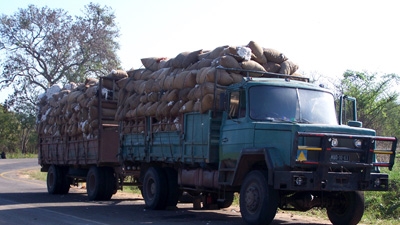MAPUTO, March 8, 2012 -- Mozambique’s success story of sustained economic rise after two decades of debilitating civil war is legendary. Average real GDP growth soared from zero during 1981-1992, to eight percent between 1993 and 2010, the fruits of political and macroeconomic stability.
Now the government is faced with pressing questions on how to continue and expand that growth to ensure steady poverty reduction, inform public policy making and, invest in infrastructure, particularly where there are mineral resources and agricultural potential, to create greater spin-off to the rest of the economy.
High-level cabinet members tackled these questions and more at a recent high-level brainstorming event, which featured participation by Hon. Aiuba Cuereneia, Planning and Development and Hon. Paulo Zucula, Minister of Transport and Communication, who both made presentations at the event. The Deputy Minister of Foreign Affairs participated as an observer in a meeting that gathered record participation of international development partners and the African Development Bank.
This brainstorming was an extended session of the Development Partnership Group (DPG) in Mozambique, consisting of all donor partners and the Mozambique government, which takes place every two months under the joint Chairmanship of the World Bank and the United Nations. The extended session comes at a time when the country is discovering impressive quantities of mineral resources in geographical locations where the country’s agricultural potential is, which warrants the question of how to secure infrastructure investments in those places to maximize synergies for lasting poverty reduction.
“Mozambique is at an exciting stage in its economic evolution. It’s necessary that the growth trend makes a positive difference in people’s lives,” said Laurence Clarke, World Bank country director for Mozambique, who hosted the brainstorming event. “There is growing perception that the country’s mineral resources can become a game-changer if anchored in right policies and supported by public and private investments in infrastructure. The brainstorming was helpful in that it allowed us all to think collectively about these issues and put in place the strategic investments necessary to sustain and secure growth and reduce poverty.”
Participants agreed that tackling Mozambique’s “infrastructure deficit” in specific zones by applying proven concepts such as spatial development, on which the Bank made a presentation, should be a key priority moving forward. A presentation by the African Development Bank outlined a regional perspective of infrastructure challenges by comparing Mozambique’s infrastructure indicators with those of the continent. The section on infrastructure spending needs and funding gaps led to robust discussion. That presentation was followed by that of the Ministry of Planning and Development, which set the wider development context, challenges and opportunities to maximize infrastructure investments such as the existing special economic zones, as well as the favorable legal framework for the development of public and private partnerships to tackle infrastructure deficit.
In fact, sound infrastructure is critical to achieving all the goals set out in the new Country Partnership Strategy, scheduled for Board presentation in the coming days, which sets to support the country in creating jobs, improving service delivery, strengthening the investment climate, diversifying sources of growth, tackling governance, and meeting frontally the threats posed by a changing climate.
The Bank is continuing its dialogue with the Mozambique government and development partners about improving infrastructure investment planning through concepts such as spatial development and growth poles that allow for a maximization of benefits from investments.
The spatial development analysis pioneered by the World Development Report 2009 “Reshaping Economic Geography,” provided the multi-sectoral analytical framework needed to increase effectiveness of infrastructure investments by linking with productive sectors, considering the wider local context, and other public and private efforts and interventions within and across countries.

